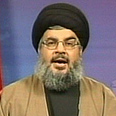
Hassan Nasrallah
צילום: AFP
The ‘new’ Nasrallah
Hizbullah’s weakening process makes prisoner swap increasingly likelier
I’m not interested in taking over Lebanon. On the contrary: I will be the one maintaining law and order in the country. We do not want to force our way of thinking upon the Lebanese people. We indeed were granted veto power in the new government, yet we have no intention of using it in favor of the opposition or the Shiite sect, but rather, in favor of the whole of Lebanon. I am uninterested in a new war with Israel, and such war is not expected, unless Israel chooses to launch one. I will maintain the stability in southern Lebanon; I’m also interested in a deal with Israel to finalize the issue of the captives.
These are the messages conveyed in recent days by “new” Hizbullah Secretary General Hassan Nasrallah – messages that were received in Israel with surprise and confusion. Indeed, in contradiction to the common Israeli perception, Hizbullah has undergone a process of weakening in the past two years, and this has only been reinforced in the past two weeks. What is the real chance for a deal that would secure the release of our captives? In order to understand this, we must peel away the archeological layers of the last two years.
The first layer: The abduction. Because his raison d'etre is premised on the struggle against Israel, Nasrallah orders the kidnapping of Israeli soldiers. He abducts Regev and Goldwasser not to provoke war with Israel, but rather, to prevent war. If he is holding captives, he has a reason for the conflict to go on, and therefore there is no need for war. The abductees were meant to be exploited by him for many years to come.
The second layer: The war. With complete surprise and contrary to his expectations, Israel embarks on war. Nasrallah is forced to utilize the arsenal he possesses and is able to enforce a tie on Israel, which he leverages via the claim of “divine victory.” This was of course a phony victory, which nobody in the Middle East bought into, except for us. From that moment on, he is obligated to escalate his rhetoric and his terms for releasing the abductees.
The third layer: Two difficult years. In the gap between the false rhetoric and the bleeding reality, Hizbullah finds itself facing true distress: extensive civilian destruction, the killing of hundreds of its fighters, and harsh accusations leveled at the organization. As a result, Nasrallah has to keep the issue of the captives alive.
The fourth layer: The pressure grows. Domestic pressure on the part of the Kuntar family and other elements prompt Nasrallah to offer a deal that is meant to keep the abductees in his hands yet give the sense of negotiations. The deal for exchanging the body of Gabriel Dwait was not meant to advance the major talks, but rather, to prevent them. In order words: Nasrallah’s raison d’etre continued to be premised on Regev and Goldwasser. In order to avoid the gist, Nasrallah attempted yet another trick: Trading body parts, which failed to materialize.
The fifth layer: Imad Mugniyah’s assassination. This assassination changed the picture. Nasrallah feared that in the wake of the assassination Israel, which acted in contradiction to what was expected of it two years earlier, would do it again. In order to prevent it, he adopted two moves: He calmed us down with a series of speeches and renewed the negotiations with the German mediators. Yet then, Nasrallah made a blunt error when he declared “open war” against Israel. He also discovered a new reason for the conflict, a greater one than the abducted soldiers: “Israel should be exterminated.” By whom? That is not his job. And he does not mention Iran either. God shall do it. At this point, his need for the abducted soldier declines.
The sixth layer: Mistake and decision. Nasrallah again makes a puzzling error, when he attacks the Sunnis in western Beirut and the Druze in the Mountain region. This is a blunt mistake that cannot be forgiven in the parameters of the renewed Lebanon. As his fighters can no longer train in south Lebanon, in light of the arrangements in the wake of the war, they do it in the Shouf region. In other words, they enter the Druze areas. The tensions lead to the brief bloodshed that took place about two weeks ago and to a Shiite withdrawal. Meanwhile, the situation stabilized. And who can the Shiite leader bring as a gift to his Druze rival? Another Druze. Samir Kuntar is Druze.










